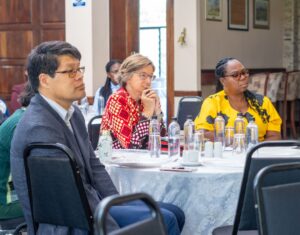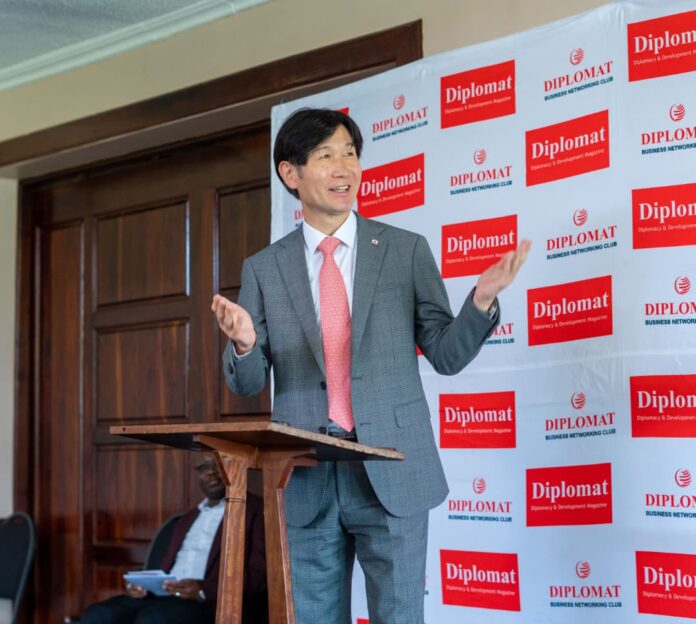By Reginald Chapfunga
In a world where health and technology increasingly define a nation’s progress, few stories are as inspirational as Korea’s. Speaking at the Diplomat Business Networking Club Breakfast Meeting held at the Royal Harare Golf Club recently, the Republic of Korea’s Ambassador to Zimbabwe, His Excellency Mr Jae-Kyung Park, shared how his country transformed from post-war hardship to a global leader in healthcare and biotechnology.
Under the theme Health and Wellness Innovation, Ambassador Park’s address was both a reflection on Korea’s achievements and a call for deeper cooperation with Zimbabwe. “Korea’s healthcare industry embodies a simple yet powerful vision — that economic growth and human well-being can advance together,” he said.
A Model of Universal Care and Efficiency
Korea’s health journey began with a bold commitment to universal access. In 1989, the country achieved nationwide health coverage under the National Health Insurance system, ensuring that every citizen — regardless of income — could access affordable, quality healthcare.
“It is never easy to design a system that delivers quality services in an affordable and accessible manner,” the Ambassador noted. “Yet Korea’s model, based on shared responsibility and efficiency, has succeeded.”
 The scheme operates under a single public insurer, keeping administrative costs among the lowest in the world — around three per cent. Patients typically pay just a fraction of their medical bills, while the rest is covered by the insurance fund. More than 90 per cent of hospitals are privately operated, creating healthy competition within a public framework.
The scheme operates under a single public insurer, keeping administrative costs among the lowest in the world — around three per cent. Patients typically pay just a fraction of their medical bills, while the rest is covered by the insurance fund. More than 90 per cent of hospitals are privately operated, creating healthy competition within a public framework.
Today, Korea ranks among the top OECD nations for access, efficiency, and patient satisfaction — a foundation that has allowed its medical sector to flourish both at home and abroad.
Biotechnology and the Rise of “K-Medical”
Health innovation has become one of Korea’s strongest engines of growth. Its biopharmaceutical industry — powered by global players such as Samsung Biologics, Celltrion, SK Bioscience, and Hanmi Pharmaceutical — has positioned the country as the world’s second-largest producer of biosimilars, supplying affordable life-saving medicines to more than a hundred countries.
“Korea recognises healthcare and biotechnology as strategic pillars of its future economy,” said Ambassador Park. “Our progress in manufacturing, vaccine development, and research has not only strengthened our economy but has also improved global access to quality healthcare.”
The term “K-Medical” now signifies both cutting-edge medical technology and a people-centred approach. Last year, over one million foreign patients travelled to Korea for treatments ranging from advanced cancer care to cosmetic and dental procedures — a testament to global confidence in Korean expertise.
Digital Transformation and Global Cooperation
Ambassador Park highlighted how digital innovation is shaping the next frontier of Korean healthcare. With nationwide 5G coverage and over 95 per cent of hospitals fully digitised, the country is at the forefront of AI-driven diagnostics, telemedicine, and smart hospital systems.
A thriving start-up ecosystem is also revolutionising medical imaging, predictive diagnostics, and digital therapeutics — supported by government policies that foster collaboration between academia, industry, and international partners.
This spirit of cooperation, the Ambassador said, extends well beyond Korea’s borders. Through the Korea International Cooperation Agency (KOICA) and partnerships with WHO, Korea supports public health projects across Africa.
“In Zimbabwe, KOICA and the Africa Future Foundation are working together to improve rehabilitation for children with disabilities in Harare, Gwanda, and Bindura,” he noted. “Over the next three years, additional hospitals will expand access to these vital services.”
Partnerships for Progress
Ambassador Park acknowledged Zimbabwe’s health challenges but praised the resilience of its medical professionals. “We deeply admire the dedication of Zimbabwean doctors and nurses who serve their people under difficult conditions,” he said.
Korea, he explained, hopes to deepen cooperation through four key areas: expanding health infrastructure, training medical personnel, introducing digital health systems, and fostering public–private partnerships.
“We can support the development of hospitals and clinics, empower health professionals through training and exchange, and provide telemedicine and digital health solutions for rural communities,” he added. “Korean companies stand ready to collaborate with Zimbabwean institutions in advancing medical technology and healthcare delivery.”
A Shared Vision for the Future
As the world moves towards more inclusive and technology-driven healthcare, Ambassador Park’s message was one of hope and partnership. “Korea stands ready to be your partner, investor, and friend,” he concluded. “Let us work together to build a future where healthcare is not only more advanced, but also more inclusive, more resilient, and more humane.”

